LFGA Web
Week 1 - What I learned
2021/04/06 to 2021/04/12Overview
This week was a lot of work, a lot to read and watch videos. We have had to learn a lot about how to learn, how to work smart and things related to cognitive aspects. Here are some of my learnings from the week I feel happy and excited for everything I have learned and what I still need.
Readings
How to Talk to Anyone - by Leil Lowndes
How many times you encounter a person and 5 minutes later you are telling your love story to that new person? Have you ever met a person that can talk to anyone in its way? And finally, have you ever met somebody that makes the interaction quite boring and uncomfortable? Well, in the world we are likely to find people that make conversations really interesting and comfortable and others who not. It's all about conversational people skills. This book gives us tricks of how to talk to anyone and these are my impressions.
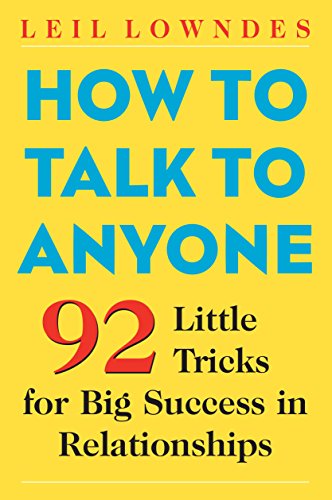
The book appears to consist of 9 chapters and in each one is about a different topic and situations. I'm going to try to pull apart each chapter and situation.
First impression
I think that this is one of the most important points, giving the first impression to someone. After reading, this is how I see the first impression we should show to anyone. First of all, having a great posture, gestures and smile will make a great presentation, then you have to show different smiles depending on the person. First scan, then smile.
Conversation
Make eye contact with the person who is talking to you, always. I noticed that in this part we are going to act like mirrors and make the person ease. Try to not be a monosyllabic person, try to make people talk. This is an important part (makes you talk like a VIP), having something to talk is important, not use short answers and the other important part is to know how to listen to other people, let them speak and shine, that will make them feel cool.
Breaking the ice
To break the ice, you basically have to meet the people that you want to meet, be the first to initiate the conversation. Them form now make them feel that you really appreciate them, don't be anxious and let people talk.
It is important to notice that talking to anyone, it's not easy, it's a skill and needs practice to really master and get to talk like a VIP. I liked the way the article shows how not to do things and some consequences. I also take with me that the way you talk could open or close doors in the society and "nobody gets to the top alone". Sometimes we need to search opportunity or things to improve and sometimes we just need to go and get it and having great conversational skills is going to help us.
I'll take the tricks with me; I'll try to practice. For now, let's begin with changing the way we talk, be sure of everything you say, don't move, dance, scratch or anything that can show that you're nervous or lying. Make eye contact and avoid short answers and throw bait and let the conversation flow.
Here is the link: Link
What are the most profound life lessons from Stanford Professor John Ousterhout?
In this article, Professor John Ousterhout is giving some tips or telling us some lessons of software development. It's pretty interesting what he's saying I just want to point out some things that caught my attention.

The first point that caught my attention is that Professor John "Programmers tend to worry too much and too soon about performance." basically what he says is that developers shouldn't worry about this because today's machines can do the job and that there only specific parts of the system that we should go and try to improve. In my opinion (with my limited experience), if we need to build a software and performance is critical part of the system, we need to worry about it, and we should care about it in early development phases, that will enable the team to take special considerations and also, I haven't still seen a way to develop in which you build software (having the requirements well defined) and intentionally come back to parts which are supposed to be tested and try to improve. I think it's quite a bad approach to build a software then test it without having quality attributes in mind and try to fix it later, I think that will make things harder.
Once again in my opinion, I think that developers are responsible for the system's performance and other quality attributes. I mean is like part of the system itself so, like letting the machine or the OS where the system is going to be hosted the responsibility of those quality attributes is like trying to wash the hands of the developers is something is not right. To assure quality in software is part of the job of a software engineer.
Another point that is important to note is how the author treats intuition and problems. Basically, what we need to understand is that we can't find bugs or problems without really testing a system. We have to really take systems out to production and test it here. We can't produce perfect software, we need to understand that software, like everything in life, needs to be improved. We commonly "think" that we've solved problems by just moving a couple of lines, and what the author invite us to do (which I agree) is to consider all of the external variables that could trigger the bug, do test cases, don't underestimate the bug and the causes. Now we get to the point where we need to use like our experience or intuition to solve this. But, be careful with this part intuition helps trying to find the source of a problem but that doesn't mean that analysis shouldn't be done.
Just a couple of things more, forcing all software to be replaced after some period of time, in my opinion trying to replace a software because lacks quality or bugs are present could be taken with different perspectives and sometimes replacing software with a new one doesn't assure quality and implies costs. Finally, totally agree if you don't know something just say it, I think that is a difficult area and you don't have to know everything.
Ideas are just a multiplier of execution - Derek Sivers
I'll just try to give a brief explanation of this.
 To make a business, you need to multiply the two.
To make a business, you need to multiply the two.
I can take some things from here, the first one is we are comparing ideas; we are not comparing businesses, abilities or knowledges. Everything starts with ideas is the first step to have a great business or invention. The other thing is the execution, basically it's comparing if whether we are doing something or nothing and how we do it. So, don't worry about your skills here yet.
The last thing and the most important that I take is that ideas are worth peso per pound. What I mean with by is that only the idea is not a value. The execution of ideas is what provides value and it's what really costs, doing things to execute the idea is the important here and if you don't succeed or it's a bad idea then... you'll lose something but learn things.
Missing semester: The linux shell
In this section we reviewed some concepts of the Linux shell. I made a cheat sheet, I'm just going to paste it here.
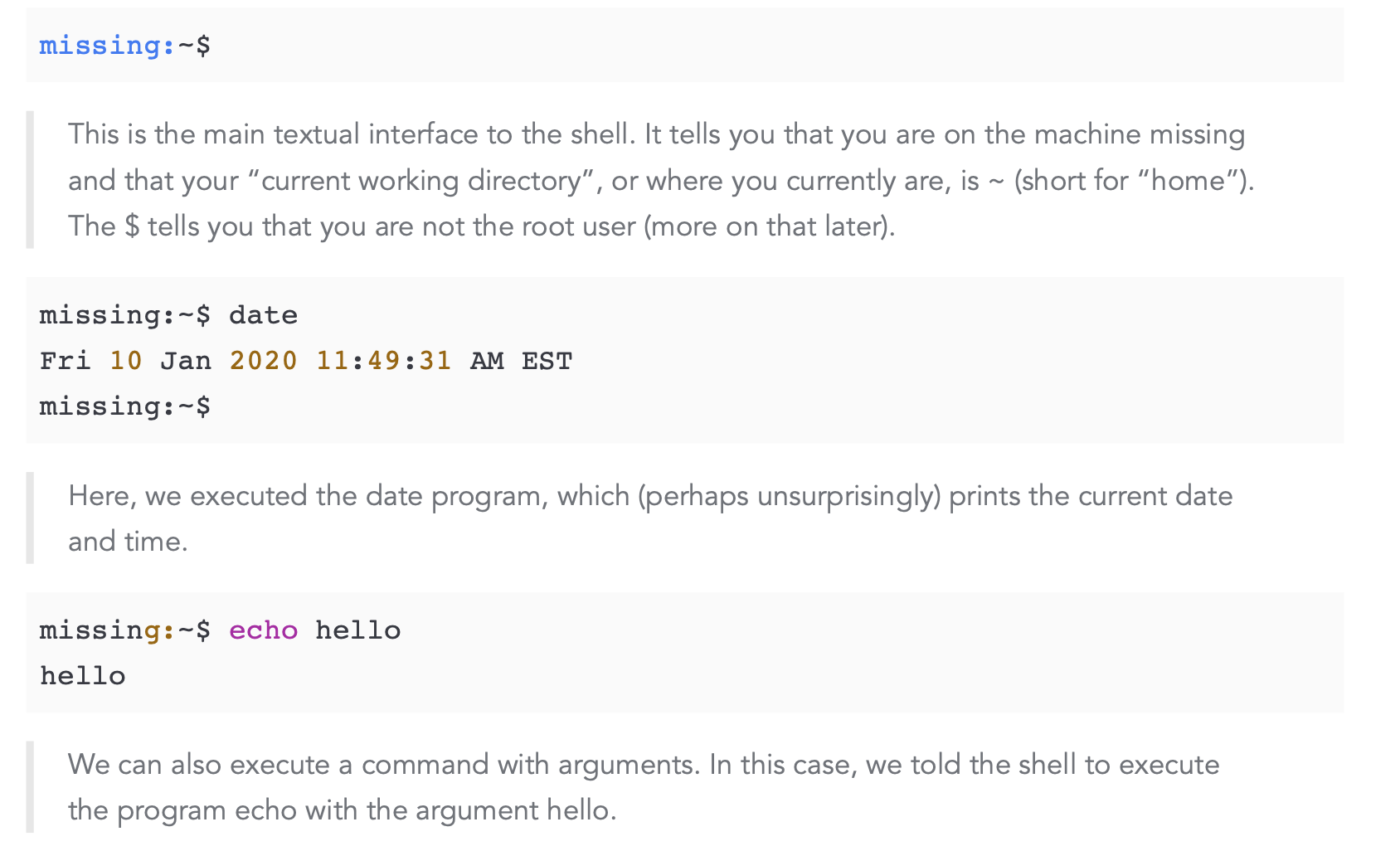
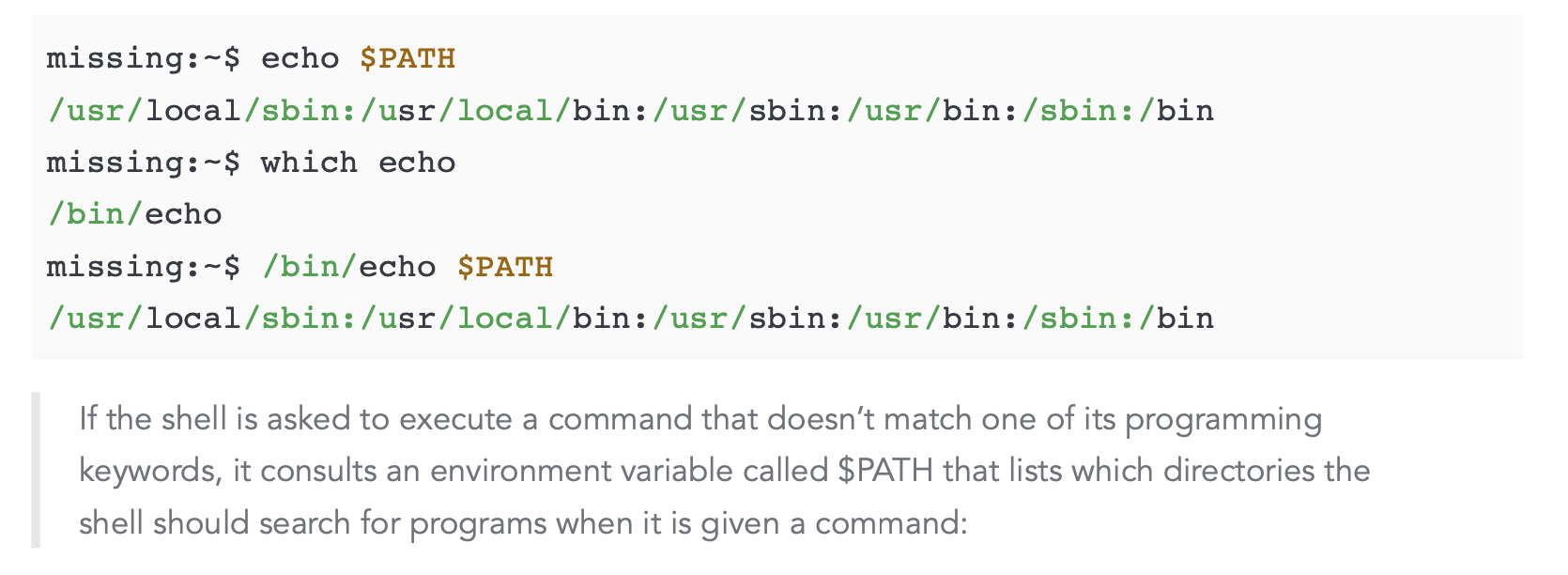
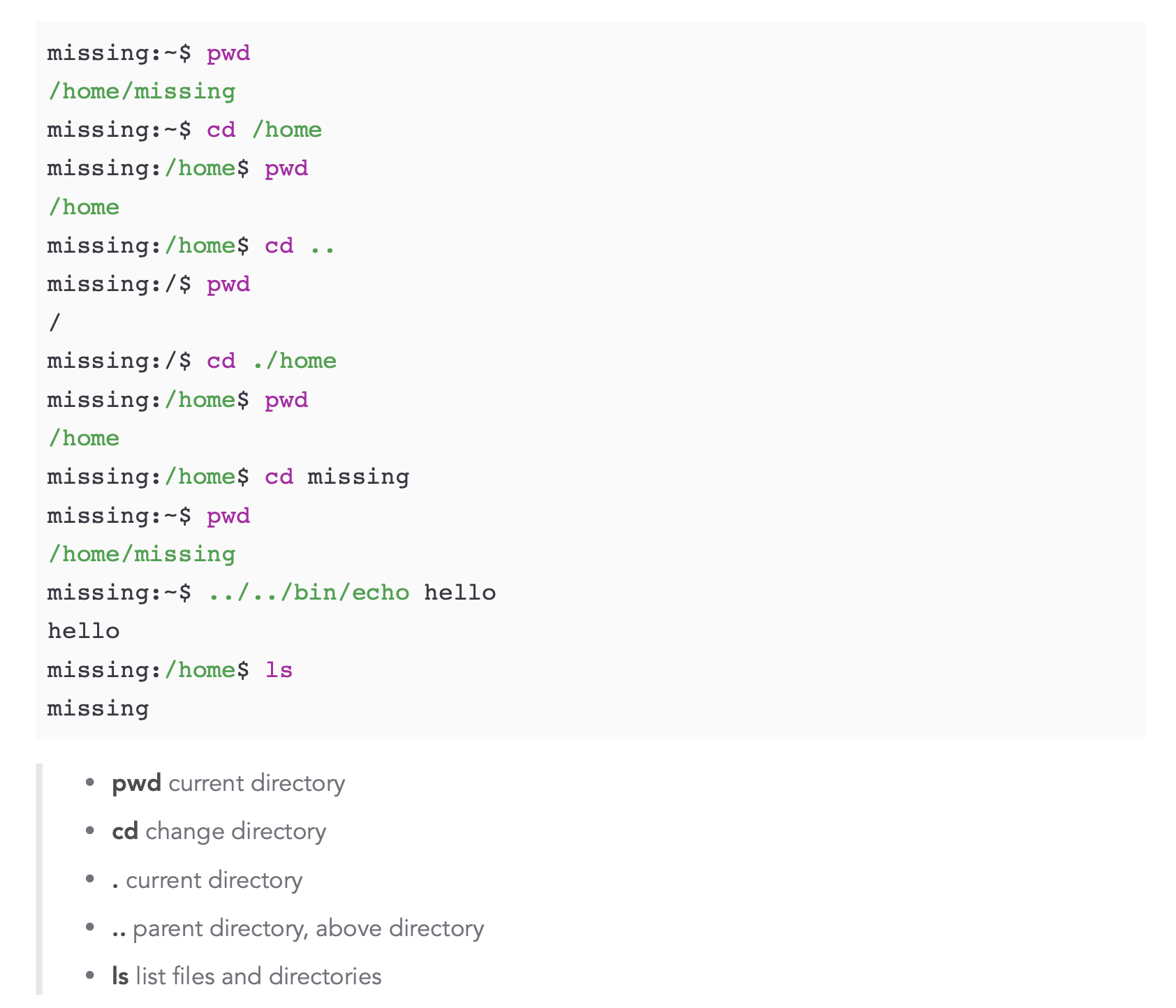
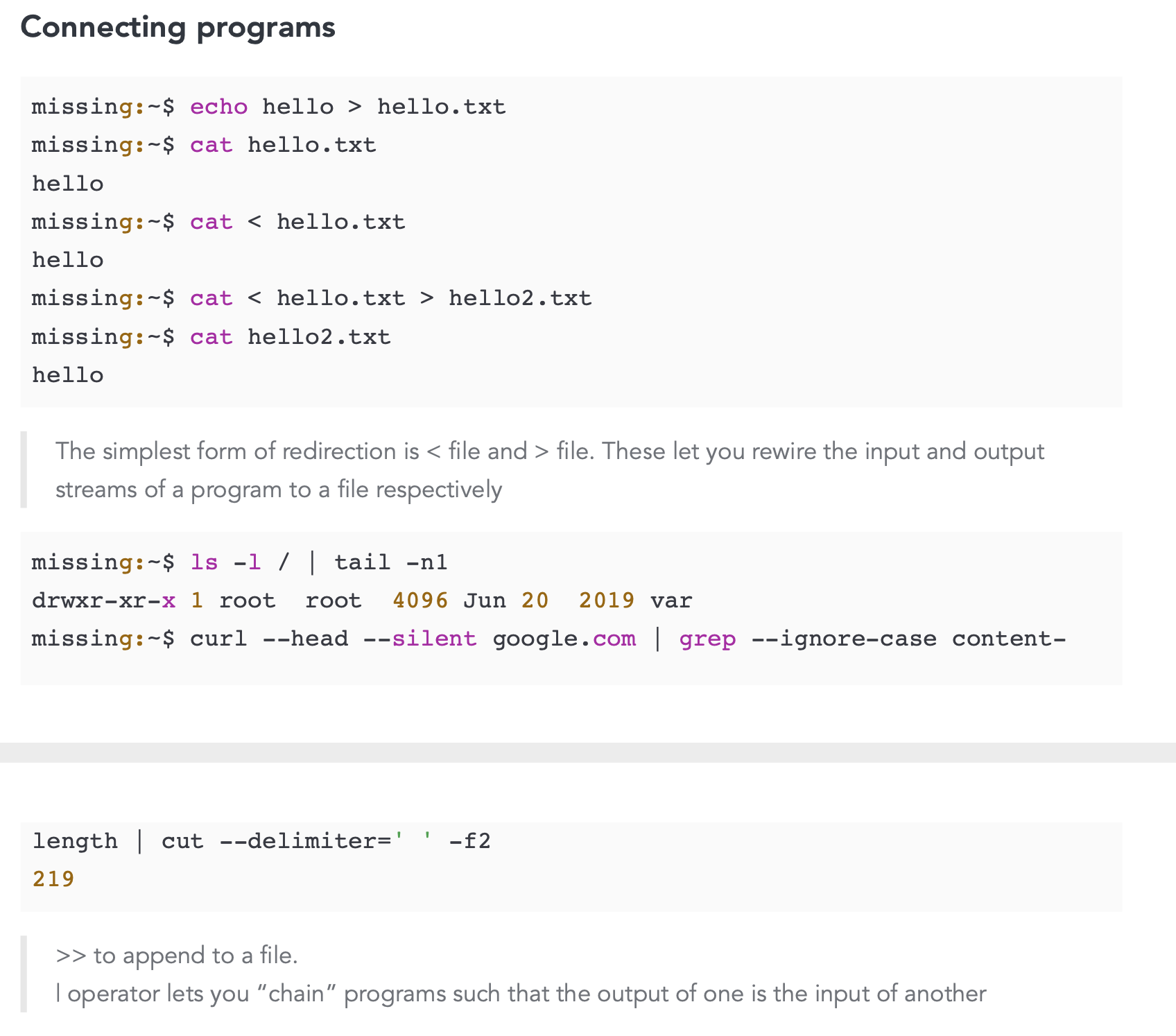
Autopilot Britain
How many times when bathing do you realize that you were somewhere else and not in your bathroom? How many times you saw somebody talking and you didn't hear a word and you only said yes? You just did something and don't remember what? Well my friend, you have been on autopilot just like a plane. In this article we learned what is being on auto pilot some causes and effects and how to snap out it. Lastly, I'll try to give my opinion and reflection.
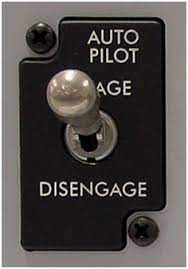
First of all, I want to say that reading this article made me realize that yes sometimes I'm on autopilot. Being on autopilot, in my opinion is only a response to the world that we are living and seeing. Due to all the problems and bad things that happens to all we have created a mechanism that takes decisions for us, it's not our conscience, it's our new unconscious decision-making system. Which is the response that wants to keep our brain from going nuts.
Now... it's this something good or bad? Well, this has several consequences. The first thing that I notice it's that you are letting other mechanisms that are not even conscious take important decisions and managing your life. That leads to do things that we don't want to do, go to places that we don't want and meeting people that we don't like. Putting these little pieces together we have as a result wasting our lives in things that we don't like.
Then, what causes this? In the actual life, everything wants our attention, people, devices, social media, etc. Everything is a distraction, external sound or distortion of what reality is. This causes distracted people, people wasting their time in social media or even people with high and impossible life goals, people who can't and don't know how to really conscious decisions.
Talking about me this was a great insight, I never imagined that this could happen to us, sometimes we think we are the owners of our life and we lose it in things that aren't happening at the moment and the true is that the only things that are real are the ones that are happening right here and now.
Now I have to accept that most of the time I work on autopilot. I'm a pacer and this reminds me of one character in "Alice in the Wonderland" that it says he has to keep going, it doesn't know where but it has to keep going. Let's try to change that, I could start by breaking things up, prioritize, try to keep me healthy. The important thing here is to notice what is happening and try to "wake up" from this.
X Workflow
X workflow is a manual for ongoing living and ever changing process for the entire company . Basically, this document is that, I'm not going to summarize everything, I just want to take with me specific points, that are interesting and new to me.
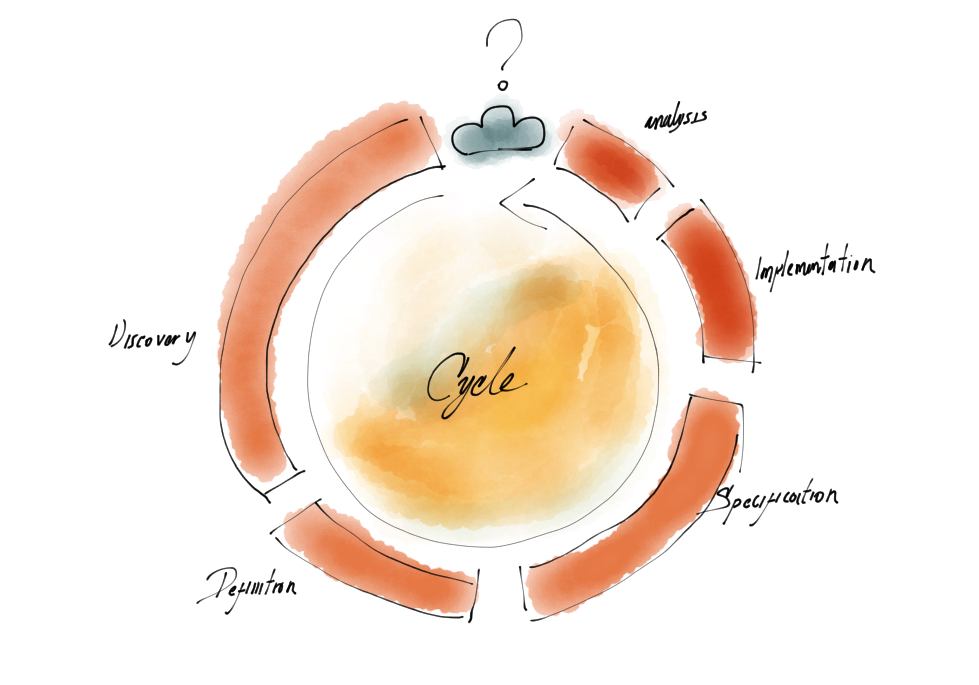 This is the flow.
This is the flow.
The first thing to note, is how to go through the process first we have to look the company as a single team, you will participate in the process and sometimes you will be in charge of a stage. What is new to me is that knowing the process makes things easier. Also, sometimes you may need to hand your work over to another peer or even takes someone's work, and you'll be able to keep going because you know the process. This made me think in the following conclusion, if you know and understand the process, then you'll become an adaptable person, which can be part, lead or understand that part of the process and that makes people useful and self-driven.
Trying to discover the real problem is not that easy. You have to do several steps before you can state what the real problem is. Any data, detail or variable is useful. To understand the problem is what will help you in further stages of the process. Here, in my opinion, you are able to do whatever you need to in order to get a well-defined requirements document. Think out of the box and don't underestimate things.
The last thing that I can notice here, is that nobody is perfect and maybe we are going to have some problems during the development of a product, because we're humans we don't have all the experience and the knowledge. There are good things too, you'll learn, the more problems you have will give as a result more researching and experience that is recommended to write down. You aren't blindfolded, you will have a guide which is the process, so stick with it. Finally, and what it says is true, is better to try something and deliver something that don't do nothing and deliver nothing.
Videos
Religion, evolution, and the ecstasy of self-transcendence
Things to learn or note:
- We are always looking for a place or feeling that makes us feel like we belong to the universe and we have a special mission here.
- We feel good when we find a place that makes us feel that we belong there. The 'I' disappears and our life changes.
- Group selection is the closest that we can get to that feeling. Group selection is a proposed mechanism of evolution, acts at the level of the group, instead of at the more conventional level of the individual. Instead of searching the individual benefit it searches common benefit.
- Sometimes opportunistic individual appears, but nature will solve this. Because nature always puts these individuals together and they will lately have to cooperate and give up by changing.
- All the things and the society that we have nowadays wasn't built by a single person this is a cooperation issue.
We really need to understand this point, we aren't one man show, we can't make big changes or achieve big goals by our owns. This also applies in the software area, developing a system or getting things done the right way more than a technical issue it is about people. That's why we work in teams and we need to be able to work as part of a team, if the ships drowns you're going to. Living is not about personal benefit and the important thing about the video is that we aren't selfish by nature, but sometimes we get lost on the way.
Creative Thinking Hacks
Things to learn or note:
- Creativity is type of work, it's a kind of effort.
- Creativity supposed to be hard.
- Ideas are made of other Ideas.
- When you're stuck, break ideas and combine them in different ways.
- We constrain our ideas based on made-up assumptions.
- As you remove unnecessary assumptions your solutions become more creative.
- Everyone is unique, your creativity is different.
- Pay attention to our own peaks of creativity.
- Persistence doesn't always work.
- You need both, smart work and hard work.
- Let the subconscious speak.
- Artist and genius fail all the time.
- The process of explaining a problem changes the way I see a problem.
- Journal (Kind of...) We depend on memories. Record Ideas
- Escape. Escape from conscious and let the subconscious mind to surface.
- Invert. Solve the opposite problem from the one you are trying to solve. Flip around and liberate. Invert It might be a good idea.
- Partner. Don't solo. Find a rival then...
- Fail. If you aren't failing, then you are not doing something difficult or creative. Don't be a chicken.
- Switch modes. Find a new way to represent ideas.
I have to say that I had a misconception on how ideas are born. I believed in a magical or muse thing, I didn't realize that ideas were born in the subconscious while we're awake. What I understand now, is that ideas are born being part of other ideas, parts of other ideas and the subconscious is trying to build something, and then when that happens you get ideas. First that I noticed, source of ideas or creativity is not an inaccessible place for us. We have like these triggers to get there!. That was a great insight for me!. Creativity is type of work, it's a kind of effort.
Now, another error that I was making is to constrain my ideas. Sometimes, I have some ideas, but due to my own preconceptions and constraints, I don't execute them, so I can't learn anything or even know if is a good or bad idea. Once again, I can recall that is all about the execution, no the idea.
Now, I could now try to change some things. I'm going to try to get more ideas, let that space flow, not rush things. Let the subconscious participate, go out for a walk, relax, take my time and don't let devices bother me. Now, if I come to an idea, then really execute them and find the answers that I'm looking for. If I fail quickly then I'll learn quickly.
How Progress Really Happens
Things to learn or note:
- We try to change tools and they aren't responsible for the change.
- Change doesn't start from a tool. It's about the amount of "power" in us, that makes change.
- People don't like change. Creates work, thinking, interaction and risks.
- Idea killers at work.
- Discomfort is what sometimes causes the change.
- We resist change.
- Change also dependes on the person that wants to make it. Not only the idea, but the execution.
- Power: what you have and what you can do.
- How progress happens: Power, Persuasion and Intuition.
- Individual work. Take part of the idea, things that I can do and show it to anybody that can help me.
- Managers talk about change, but they don't change the way they manage.
- Change is about people and risk that are willing to make.
This is so true, a lot of us and companies really try to make changes and they think that change is about tools and this is a mistake. All the big changes in history are about people and their beliefs. The other thing that is true is that they never do things alone. Change is the result of a lot of people thinking the same and doing things together, it's about the execution. That's why we found nowadays a lot of communities that are sharing their beliefs and doing tons of things that make change.
Peak: How to Master Anything
Things to learn or note:
- Repetition, hours of training other similar techniques won't take you to master a discipline.
- The mental representation is an image that is created in the mind about us doing a certain action and there we can visualize how it is done correctly
- Mental representation is part of deliberate practice.
- Purposeful Practice + Expert coaching = Deliberate Practice.
- Purposeful Practice is to have a specific goal, intense focus, immediate feedback and frequent discomfort.
- Purposeful Practice will lead you to use your creativity to solve the problem.
- Expert coaching could share the experience and shorten the learning path.
Some insights about this, repeating won't make you a master neither 10,000 hours of practice instead 10,000 hours of deliberate practice will do. What I can notices is that sometimes I am practicing and I'm thinking other things and not putting attention and well, I think that is better to just practice a little time, but really being focusing than hours practicing without focus. Deliberate practice is also about practice quality.
Making Badass Developers
Things to learn or note:
- We have limited cognitive resources, we are not humanoid.
- We have to reduce cognitive leaks. It's about using our brain to do a task.
- Using willpower = Losing cognitive processing.
- Expertise requires cognitive resources.
- Use this framework.

- A and B will take cognitive resources.
- C are things that we master and we don't need a lot of cognitive resources.
- We have to master things
- Split learning into little pieces.
- Take those pieces and learn it in a simple session.
- We need to bypass B.
- We need to not know and, then quickly and fast pass to master.
- It's all about how fast you learn things.
- The brain does things we can't understand. Sometimes we just do things and we don't know how we do it. Stick with experts can help to develop this.
- The brain is pattern-matching.
- Take care of other's cognitive resources.
This was a great topic. Basically what I can understand is that we as developers waste a lot of time and energy on learning things. We think that the more we learn and the more time we spend the better results we are going to get. Well, We were wrong, is not about the quantity is the quality and smart work. The faster we can learn things and master, the better it will be because that way we aren't going to waste our cognitive resources.
What know I'm going with this is:
- Try to label things that I don't know, can do with effort, Master.
- Split all the things that I have to learn.
- Only focus on that thing until I mastered. One at the time.
- Try to focus on the things that became a need.
- Not overload my brain.
- Instead of working hard, work smart.